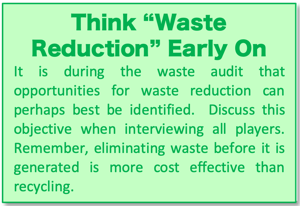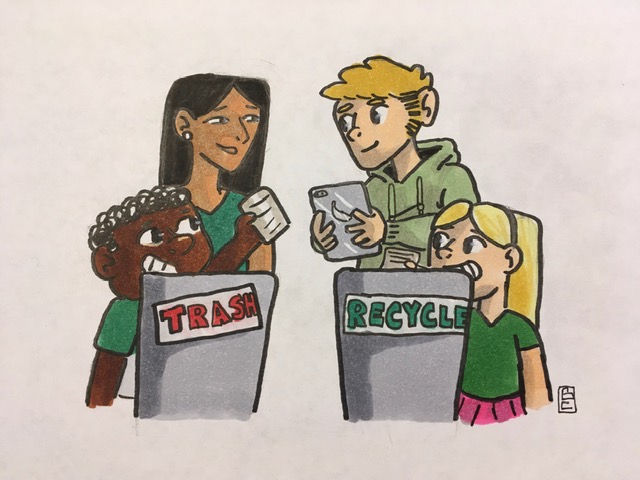
Phase Three: Gather Information
There are a number of sources to consult when determining which materials are acceptable in your school’s recycling program and how to prepare them properly.
A list of commonly acceptable materials includes:
- Corrugated cardboard boxes,
- Other paperboard/chipboard boxes, such as facial tissue and cookie boxes,
- Paper such as copy paper and other standard types of paper such as construction paper, mail, newspaper, magazines, file folders, paperback books,
- Containers such as plastic containers #1 and #2 (see explanation below), aluminum cans, steel cans, glass bottles and jars.
Be aware that each county in New Jersey has a list of materials that must be source separated and recycled by law. Additionally, some municipalities and recycling facilities may accept additional materials. There may also be some specific ways that materials need to be prepared for each facility. Examples of some less commonly acceptable materials in school recycling programs are types of plastic containers other than those mentioned above, milk cartons, hardcover books, pizza boxes and shredded paper. You will have to determine, in concert with the facility where the school’s recyclables are delivered, whether any of these materials are acceptable. Of note, most facilities will not accept materials in plastic bags.
Review this example of a list of standard recyclable materials found in schools that was prepared for Morris County schools by the Morris County Municipal Utilities Authority (MCMUA). You will need to create a list like this for your school.
Once your list is finalized, it will become the basis of all of your educational and promotional materials and messages disseminated school wide. This is an important step, so allow time to be sure it is accurate.
These are some steps to determine those targeted/acceptable materials for your school:
Contact your municipal and/or county recycling coordinator for help. Your local recycling coordinators are very knowledgeable about the types of materials you should be targeting/accepting in your recycling program and are familiar with the available recycling haulers and facilities. They will often be able to provide helpful educational and promotional materials or assistance to target the specific materials in your recycling program. They will also be able to help provide the next two items in the list.
Obtain a copy of the “mandated” materials list for your county and municipality.
By law, each of New Jersey’s 21 counties maintains a list of the mandated or designated materials. By law, these materials must be kept separate from trash at the point where they are generated; this is called “source separation.” Stated another way, it is illegal to mix mandated recyclable materials with trash. Therefore, a collection system that does not keep mandated recyclable materials separate from trash at the school is not in compliance with the law. If a hauling company representative tells you it will separate the recyclable materials from the trash at their facility, that practice is violating the law in New Jersey. Your school needs to keep all mandated recyclable materials separate from trash.
The New Jersey Department of Environmental Protection (NJDEP) maintains a list of mandated materials by county. Also, you can visit your county’s recycling website to see if that office has a better form of the list that may include specific definitions for each material category. Mandated materials are included in each County Recycling Plan. Print the list for your county. You will need to refer to it. Additional materials that may be mandated by your municipality are included in the municipal recycling ordinance. Contact the municipal recycling coordinator to determine if they have mandated other recyclable materials than those mandated by the county. Of note, schools are considered part of the commercial sector.
Your municipality may use RecycleCoach, an application with a “What Goes Where” search tool. You can search for your municipality on the RecycleCoach website. From there, you can either download the app or visit your municipality’s recycling page to use the “What Goes Where” search tool. Some municipalities in Atlantic County for example, use a tool called Waste Wizard powered by ReCollect. Look for similar tools on your municipality’s website for help to determine what to do with questionable materials.
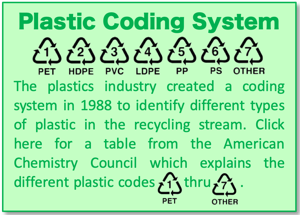 Please be aware that recent trends regarding acceptable types of plastics for recycling have restricted the types of plastics accepted in an effort to keep unacceptable material out of the stream. Plastic containers are coded #1 – #7. This coding system is explained in the side box. In the past, many recycling facilities advertised the acceptance of all numbers #1 – #7. Since 2017, however, this has proven to be unsustainable because facilities that separate and recycle all those types of plastic received too many other unacceptable materials and some of those plastics simply were not able to sorted and recycled.
Please be aware that recent trends regarding acceptable types of plastics for recycling have restricted the types of plastics accepted in an effort to keep unacceptable material out of the stream. Plastic containers are coded #1 – #7. This coding system is explained in the side box. In the past, many recycling facilities advertised the acceptance of all numbers #1 – #7. Since 2017, however, this has proven to be unsustainable because facilities that separate and recycle all those types of plastic received too many other unacceptable materials and some of those plastics simply were not able to sorted and recycled.
Further, as a cautionary note, #6 PS, which stands for polystyrene (often called Styrofoam®), the material used quite often for disposable cafeteria food  trays, has extremely limited opportunities for recycling, especially after coming into contact with food. It is most common that materials labeled #6 PS must be put into the trash.
trays, has extremely limited opportunities for recycling, especially after coming into contact with food. It is most common that materials labeled #6 PS must be put into the trash.
Additionally, find out if milk cartons/juice boxes are acceptable in your recycling program. Milk cartons/juice boxes are usually not a mandated material. Their acceptability in the recycling stream will depend on whether or not the facility receiving your school’s material will accept them. If they are acceptable and you do decide to include them in with other recyclables, you may need to create a separate emptying/collection area in the cafeteria for students to empty the liquids. This video explains a milk carton collection program at a school in Sussex County.
It is also recommended that you determine items in the waste stream, in abundance, that are easily mistaken as being acceptable for recycling. For example, snack wrappers from chips, juice pouches and small plastic cups from fruit or jello often are thought to be acceptable for recycling, however it is likely that they are not acceptable at your recycling facility. The snack wrappers and juice pouches are made from materials that are not acceptable. Although the small fruit or jello cups are plastic, they often do not have a recycling code on them. Plastics with no code should be discarded in the trash. The size of the containers may also be an issue. In Morris County, for example, the sorting system is unable to properly sort and capture plastic items that are about 6 ounces or smaller. It is important to address these unacceptable items in your educational materials. Below are three documents created by the MCMUA for schools in Morris County showing some of these items which are commonly mistaken to be acceptable as recyclable materials.
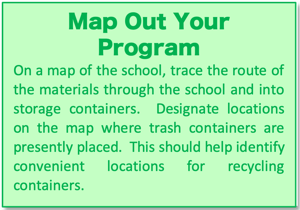 Your team’s next task is to get a handle on the current trash and recycling situation at your school. A walkthrough assessment includes the following steps:
Your team’s next task is to get a handle on the current trash and recycling situation at your school. A walkthrough assessment includes the following steps:
- Tour each facility/school.
- Survey visually and through interviews the amounts and types of trash and recyclable material generated.
- Inventory the locations and quantity of trash and recycling containers currently in use. Include both inside and outdoor containers, as well as outdoor collection dumpsters, noting sizes and collection frequency. See the forms section below for tools to log your inventory.
- Discuss current methods of collecting/handling of trash and recyclable material with buildings and grounds managers and personnel.
- Discuss storage and collection options with the staff and hauler.
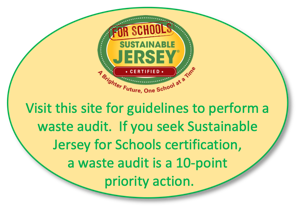 After the walkthrough assessment, you can also do a more detailed “waste audit” to determine the amount of trash generated and how much of it is acceptable in your school’s recycling program and how much is currently being put into recycling containers. You can also determine how much of the recyclable material is going into the trash. A waste audit takes some planning and effort, so make sure you have the time to conduct one. You may be able to get assistance from your municipal and/or county recycling coordinator. To see what is entailed, watch this video on conducting a school waste audit.
After the walkthrough assessment, you can also do a more detailed “waste audit” to determine the amount of trash generated and how much of it is acceptable in your school’s recycling program and how much is currently being put into recycling containers. You can also determine how much of the recyclable material is going into the trash. A waste audit takes some planning and effort, so make sure you have the time to conduct one. You may be able to get assistance from your municipal and/or county recycling coordinator. To see what is entailed, watch this video on conducting a school waste audit.
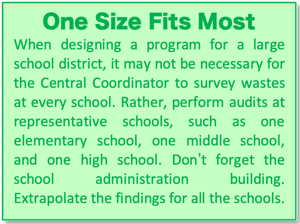
If you decide that a waste audit is not something you have time to do at this point, you can always consider doing one to evaluate your progress at any point. In the meantime, the following is a section from the Executive Summary in Digging Deep Through School Trash, A waste composition analysis of trash, recycling and organic material discarded at public schools in Minnesota, (September 2010):
Methodology
All the waste from the schools’ trash, organics recycling, and recycling streams was collected for two days and identified by school, the waste stream, and the day it was generated. Collected waste was then sorted into 19 material categories. This allowed analysis of total generation and composition, as well as contamination of recycling and organics recycling, and capture rates for all of the schools.
Key results
- Over seventy-eight percent (78%) of school waste materials could be diverted from the trash to organics composting and container and paper recycling collection programs.
- Fifty percent (50%) of school waste could be managed via organics composting programs that accept food waste, liquids and nonrecyclable paper.
- The most prominent single material generated by schools was food waste, which was 23.9% of the total waste generated.
- True garbage, at 15.04%, was the second most prominent single material in the waste.
- Recyclable paper — materials from the three categories of “cardboard”, “white office paper” and “mixed paper” — accounted for 23.51% of the total waste materials generated by schools.
- Nonrecyclable paper was also a particularly prominent material, at nearly 11%. Nonrecyclable paper includes items such as paper towels, napkins and paper plates, which are accepted in the subject schools’ organics composting programs.
- Twenty-eight percent (28%) of school waste, by weight, could be diverted into the recycling stream.
- The subject schools had an average waste generation of .52 lb per capita per day.
- The six schools collectively had a 41.15% overall recycling rate.
- They are capturing 65.65% of the recyclables they generate and capturing 27.27% of the compostables they generate. If 100% of the recyclables and compostables were captured the recycling and composting rate could rise to over 78%.
- The percentage of individual recyclable materials generated at schools that are collected (captured) for recycling varies. For example, 33.22% of all the plastic bottles, 56.97% of mixed paper, and 95.36% of cardboard are captured for recycling.
- The percentage of compostable materials captured by the organics composting programs was 27.77%.
- A total of 62.9% of what is currently thrown away in the trash is compostable or recyclable. Compostable materials are 47.38% of what is thrown away in the trash, and recyclable materials make up 15.5% of the trash.
Conclusions
Substantial components of the waste stream in Minnesota schools could be reduced, recycled or composted. There is great opportunity to expand and improve school recycling and composting programs. In addition, this study points to opportunities to reduce overall waste generation by adopting additional waste prevention strategies and implementing expanded use of reusable items. Although schools are not, per capita, the largest waste generators in the state, their waste impact is significant because of the sheer number of schools, students and staff. Making the effort to act on the potential for improved waste management at our schools will return dividends in schools’ budgets and in conserved natural resources.
Below you will find various forms and accompanying instructions from different sources for performing walkthrough assessments and/or waste audits in your school(s).
These 3 files from Minnesota may be of use for a walkthrough and for tracking waste and recycling:
- Building walkthrough worksheet
- How to track waste and recycling
- Waste and recycling tracking worksheet
These 3 files from the Morris County MUA are also useful for logging the containers located throughout each school during the assessment:
- Instructions for using Assessment form
- Assessment form for Single-stream recycling program
- Assessment form for Dual-stream recycling program
Here is a spreadsheet to use for performing a waste audit.
Visit this link to the NERC, the Northeast Recycling Council, website, which provides good information and forms for waste assessments and waste audits (Aug 2010).
Copyright ©August 2010 by Northeast Recycling Council, Inc. www.nerc.org Permission to copy is granted, provided that the copies are not made or distributed for resale and that the copyright notice and this notice are retained. NERC is an equal opportunity provider and employer.
While you are doing the prior step, you can start learning about your current trash contract. Your municipality may provide trash and/or recycling collection service for your schools, or your district may contract for services on their own. If there is a contract for the trash and/or recycling services, become familiar with the terms of the contract including the start and end dates and if there are any optional extensions to the end date. You will need to determine exactly what services are provided. Is recycling collection included, or is the contract for trash collection only?
As you reduce trash and increase recycling you’ll need to “right-size” your dumpsters and collection frequency. Often, this “right-sizing” process is where districts can see substantial savings. Your trash contract will influence this process, so it is best to learn as much as possible about the contract. “Right-sizing” both your trash and recycling dumpsters is something to be revisited after your new recycling program is up and running for a while. You should see a shift in material out of the trash dumpsters and into the recycling dumpsters. You should monitor the dumpsters to see how full they are when the contents are collected. You may be able to reduce size, quantity and/or frequency of collection, which should save money. This concept is discussed again in Phase 4 below.
The reference documents provided in this section apply only to NJ school districts, and the “user” is urged to consult the Public School Contracts Law (NJSA 18A:18A-1 et seq) and the school board attorney. Municipalities must follow the rules of the Uniform Bid Specifications (NJAC 7:26H-6.6 (a)) and Local Public Contracts Law (NJSA 40A: 11-1 et seq).
Under most circumstances, there should be no need to change your contract with the school’s existing trash hauler. The hauler will still be removing the school’s trash just less of it. If a fixed price was established annually regardless of the amount of trash generated, then that may need to be rebid to a lower price or a “per pull” charge.
During this contract review process, you will also need to select a vendor to take the school’s recyclables. This service may need to be bid as well.
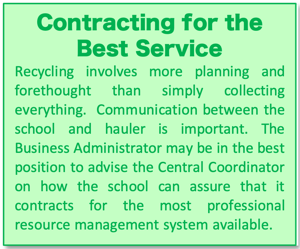 Work with your school procurement or business official, buildings and grounds manager, and administration to review the existing contract. Your municipal or county recycling coordinator may also be able to help here with the contract and with finding recycling options.
Work with your school procurement or business official, buildings and grounds manager, and administration to review the existing contract. Your municipal or county recycling coordinator may also be able to help here with the contract and with finding recycling options.
Between the data you collected for the previous step, the options available in your county according to your county solid waste office, and options available from your hauler, your team can discuss the types of material you want to collect for recycling. Your Business Administrator or Procurement Official can assist in determining the actions needed in this step.
Consider these questions in your review:
- How often are trash and recyclables currently emptied?
- Are your dumpsters full when they are emptied?
- What kinds of recyclable materials are being collected?
- What kinds of recyclable materials would you like to have collected?
- Can you make changes, if needed, without penalty?
- When does your current contract expire?
- Can your hauler provide any data about what they collect at your sites (e.g., weights)?
When soliciting bids for a new contract to collect your school’s recyclables, consider the following:
- What are the recyclables the vendor will take?
- How often do they pick up your recyclables?
- Do you need extra collections at certain times of the year? Perhaps your dumpsters overflow prior to and during the start of the new school year, when new supplies are delivered in corrugated cardboard boxes. What about during locker cleanout at the end of the year? If so, perhaps you can ask for separate pricing for extra “on-call” collections.
- In addition to the collection cost, is there a cost per unit volume/weight for material removed?
- Request that the vendor/hauler provide the names and contact information for at least three persons/entities whom you can contact to request references related to the quality of their services.
Sample Bid Document:
